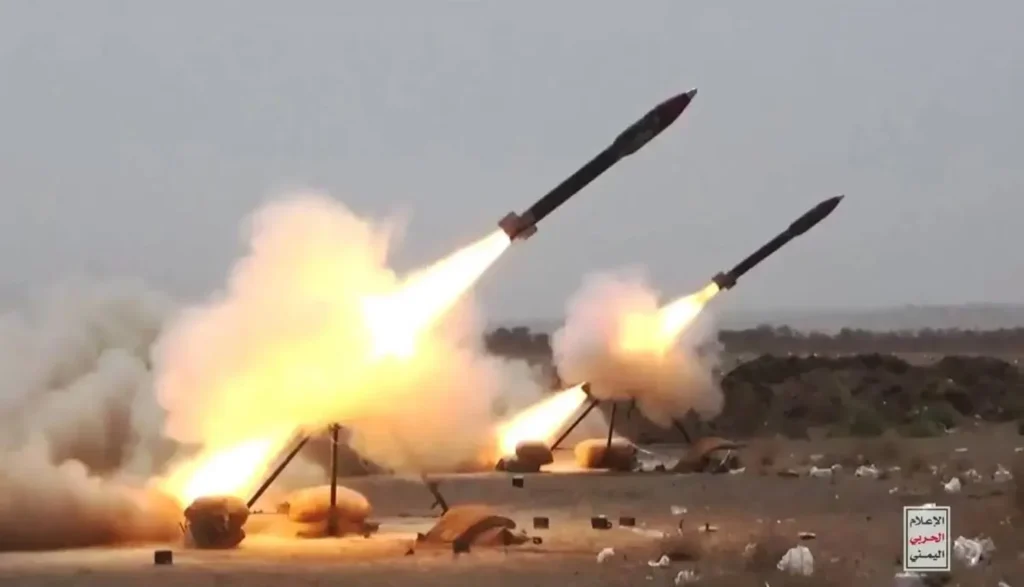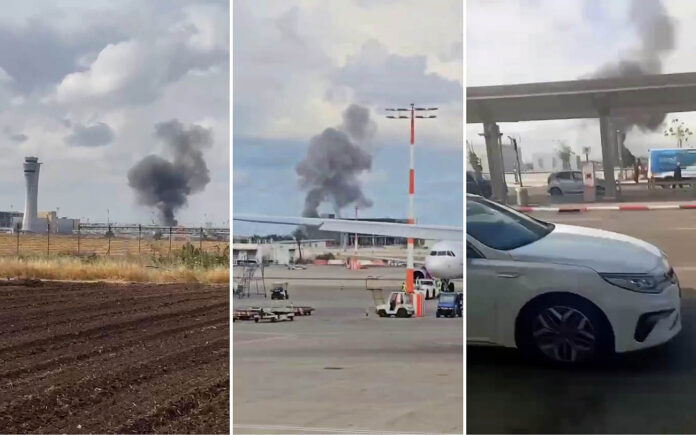A ballistic missile launched by Yemen’s Houthi movement struck near Israel’s main airport on a Sunday in early 2025, sending black smoke into the sky. The attack marked a rare and symbolic hit against a major Israeli target. It caused injuries but no deaths. The Houthis, a Yemeni group opposing U.S.-backed Israeli actions in Gaza, vowed to continue their campaign.
The Strike and Its Immediate Impact
The Houthi missile hit near Ben Gurion Airport, a key hub for Israel. The attack disrupted operations and exposed vulnerabilities in Israel’s defense systems. U.S. and Israeli forces attempted to intercept the missile but failed. The strike targeted a significant location, causing visible damage. The Houthis claimed they would impose an “air blockade,” though their limited resources make this unlikely. Nevertheless, their ability to strike such a prominent target demonstrates their growing capabilities. In response, the Israeli cabinet voted unanimously to expand military operations in Gaza, signaling further escalation.

U.S. Policy: Bombing Without Results
The Biden administration bombed Houthi targets almost daily, yet these strikes did not weaken the group. A ceasefire in Gaza had previously stopped Houthi attacks on shipping, proving diplomacy’s effectiveness. Instead, the U.S. continued its bombing campaign, ignoring this lesson. The policy reflects a broader pattern of relying on military force rather than addressing root causes, such as Israel’s actions in Gaza, which fuel Houthi resistance.
Trump’s Escalation and Broken Promises
Under President Trump, U.S. bombing of Yemen intensified, contradicting his earlier stance against such actions. In a 2024 interview, Trump criticized Biden’s bombings, saying, “These Democrats, they just want to go all around the world bombing people. It’s totally unnecessary.” Yet, in 2025, Trump not only resumed but escalated these strikes. Discussions among his advisors, revealed through a Signal chat, showed a casual approach to military decisions. Stephen Miller, a key aide, endorsed the strikes with enthusiasm, using fist-pound and American flag emojis. This shift betrays Trump’s “America First” rhetoric, which promised to end Middle East wars.
A History of Failed Interventions
The U.S. has a long record of ineffective military actions in Yemen. During the Obama administration, the U.S. supported Saudi Arabia’s war against the Houthis, which caused mass famine and killed countless civilians. Far from weakening the Houthis, the campaign strengthened them. “It really didn’t degrade the Houthi’s capability at all,” a 2025 analysis observed. The Houthis adapted, hiding their assets underground and dispersing their forces. Today, their ability to strike Israel despite years of U.S. and Saudi attacks proves their resilience and the failure of Western strategies.
Humanitarian and Legal Costs
Recent U.S. strikes under Trump have killed civilians, including African migrants at a migration center in Yemen. Another strike targeted a residential building, based on unverified claims that a Houthi commander was inside. These actions mirror Israel’s tactics in Gaza, where civilian deaths are often dismissed as collateral damage. Legally, the U.S. strikes lack Congressional approval, violating both domestic and international law. Yemen’s humanitarian crisis, marked by famine and displacement, worsens with each attack. In contrast, Houthi actions, while disruptive, are framed as resistance to foreign aggression.
Internal U.S. Politics and SignalGate
Within Trump’s administration, advisors like JD Vance and Tulsi Gabbard, who once opposed Middle East wars, offered little resistance to the Yemen strikes. In a Signal chat, Vance timidly questioned the policy but quickly backed down, later praising a strike on a civilian building with a muscle emoji. Gabbard, previously outspoken against Yemen bombings, also supported the strikes. “The only relevant metric is absolute loyalty to Trump,” a commentator noted, describing the chilling climate within the administration. The SignalGate scandal exposed this lack of accountability, as advisors casually discussed illegal strikes with emojis and minimal debate.
Israel’s Push for Wider Conflict
Israeli Prime Minister Benjamin Netanyahu seized on the Houthi strike to escalate tensions with Iran. Quote-tweeting Trump, he stated, “Attacks by the Houthis emanate from Iran. Israel will respond to their Iranian terror masters.” This reflects a 25-year pattern of Israeli leaders exaggerating Iran’s threat to justify aggression. The Houthis receive support from Iran, but their attacks primarily respond to Gaza’s destruction, not Iranian orders. Netanyahu’s push for U.S. involvement in a war with Iran risks a catastrophic regional conflict. For now, Trump favors negotiation with Iran, but his administration’s hawks, like Marco Rubio, threaten this approach.
Houthi Resistance and Global Solidarity
The Houthis’ ability to strike Israel despite Western bombings makes them a symbol of defiance against U.S. and Israeli dominance. Their resilience resonates with nations in the Global South, from Palestine to Africa, who oppose Western imperialism. Western media often condemn Houthi attacks while ignoring the far greater civilian toll of U.S. and Israeli strikes. This double standard fuels anti-Western sentiment worldwide. The Houthis, despite their flaws, expose the limits of military power when facing determined resistance.

